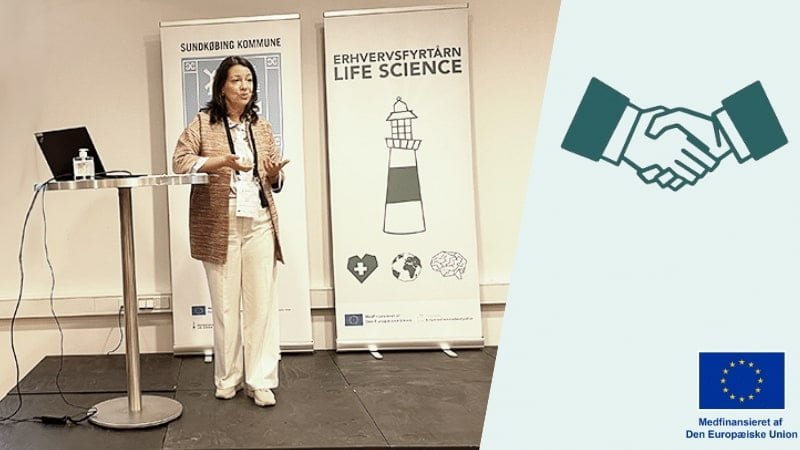In Denmark, private companies play a positive role in one in four public sector innovations.
And 69% of all public sector innovations are created in collaboration with one or more other actors outside the individual public workplace.
This high frequency of collaboration across the public and private sectors is unique to Denmark and the Nordic countries, and therefore the public-private innovation environment creates interest in the EU.
Recently, the European Commission’s Director Sofia Alves visited the Lighthouse Life Science initiative to study the partnership model in the project.
– In the EU, we are interested in the work of Lighthouse Life Science because it deals with worldwide challenges such as healthy weight, mental health and health equity. Therefore it is interesting to learn more about how the project involves both companies, the health sector and the knowledge community to support the work with these challenges, said Sofia Alves, Director of DG Regional, Cohesion and Urban Policy.
Sofia Alves participated in the event ‘Inside in a Public Space’ in Erhvervshus Hovedstaden.
Strong democracy provides openness in the public sector
Lighthouse Life Science and other similar PPI partnerships cover the gap that is often seen between the universities’ research, the companies’ innovative power and the needs of the public sector, Sofia Alves explains.
– In Denmark, you have a tradition of being a consensus-based society with a structure where all parties are consulted and where several options are considered before decisions are made. This must be one of the reasons why the public sector is open and willing to enter into partnerships with private companies and researchers, explains Sofia Alves, and believes that the open dialogue can be attributed to the tradition of a strong democracy.
There is no clear overview of the number of public-private collaborations in Denmark, but according to CO-PI (Centre for Public- Private Innovation), three out of four public-private innovations lead to improved quality. At the same time, half of the public-private innovations lead to increased employee satisfaction, and close to half increase efficiency.
Lighthouse has engaged more than 350 companies
The Lighthouse Life Science – Mental Health runs from autumn of 2023 for three years and has received DKK 72.8 million from the Danish Board of Business Development. Since Lighthouse Life Science was established by the Danish Business Authority in 2021, more than 350 companies have engaged in the partnership, and the partnership model has aroused international interest. The partners have shared experiences in the European Commission, Italy, the United States and Canada, among others.
Right now, Lighthouse Life Science has an open pool where you can apply for funding for public-private innovation that meets Danish and international challenges in mental health and health equity.
Complex challenges are best solved in partnerships
Today, there is a lack of knowledge about how to collaborate and organize well-run partnerships, and this knowledge comes from, among other things, insight into how to operationally, tactically and strategically run a partnership.
This is what the report reads, among other things, ‘10 recommendations – how sustainable partnerships can create new effective solutions, ready for implementation‘.
The knowledge created and collected in Lighthouse Life Science will set a precedent for how to form good public-private partnerships to solve complex challenges.
The report’s first recommendation reads: Establish long-term, strategic partnerships if the challenge is complex.
Lighthouse Life Science is co-financed by the European Union and led by Danish Life Science Cluster.
Discover more about Danish Life Science Cluster:
Danish Life Science Cluster is a Danish national cluster for life science and welfare technology. We connect partners, drive innovation, and create networks between companies, research institutions, and organizations within life science and welfare technology.

